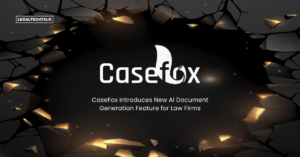In a thought-provoking interview with Olga, we delve into the evolving landscape of in-house counsel’s roles, focusing on both the opportunities and threats they face in the current legal environment. Olga provides insights into how artificial intelligence (AI) is transforming the legal field, the ethical challenges it presents, and the crucial role in-house counsel must play in navigating this new terrain.
Bradley Collins: Hi Olga, nice to speak with you. I’d love to get your take on the biggest opportunities and threats for in-house counsel at the moment?
Olga V. Mack: The emergence of artificial intelligence is transforming the legal field, providing both promising opportunities and unique challenges for in-house counsel. AI offers the chance to automate tasks like reviewing contracts or identifying legal precedents, freeing up time for more complex legal work.
This transition, however, requires in-house counsel to don a new hat – that of AI trainers, guiding the technology to cater to their organization’s needs.
At the same time, AI’s rise presents a new frontier in law and ethics. In-house counsel can become invaluable navigators, ensuring that their organization not only harnesses the power of AI but also remains ethically grounded and legally compliant. However, this new landscape isn’t without its pitfalls. Staying abreast of the rapidly evolving laws and regulations related to AI can be akin to hitting a moving target. Missteps can lead to significant legal and financial repercussions.
Over-reliance on AI tools also presents a risk. AI can streamline tasks, but if misused or not adequately trained, it can lead to inaccuracies, potentially exposing the organization to legal risks.
Moreover, in-house counsel will have to wrestle with new ethical challenges tied to data privacy, biases in AI decision-making, and the impact of AI on employees and customers. Balancing technological innovation and ethical responsibility will be a crucial part of their role.
In essence, the rise of AI is setting the stage for a dramatic evolution in the role of in-house counsel, opening up exciting new opportunities but also demanding a careful navigation of potential risks and ethical dilemmas.
Bradley Collins: They say AI won’t replace people, although those using AI will replace those who don’t – how do you see roles evolving over the next few years?
Olga V. Mack: In the evolving landscape of artificial intelligence, we’re likely to see an ongoing transformation in the legal profession, but not necessarily a replacement of lawyers by AI. The key aspect of this transformation is how AI will be integrated into legal practices and how it can augment the capabilities of legal professionals.
Augmented Legal Practice. Lawyers who effectively use AI tools for tasks like legal research, contract analysis, and drafting of legal documents will have a considerable edge over those who don’t. AI can automate and streamline routine tasks, allowing lawyers to focus more on strategic and nuanced legal arguments, as well as fostering stronger client relationships. Legal AI Literacy. The ability to effectively use AI tools will become an increasingly important skill for lawyers.
Understanding AI, its applications in legal practice, and its limitations could become as fundamental as traditional computer literacy is today. Lawyers who don’t adopt these tools might find themselves at a disadvantage in terms of efficiency and accuracy.
Uniquely Human Legal Roles. Despite AI’s growing capabilities, there are aspects of legal work that are likely to remain human-centric. This includes roles requiring empathy, such as family law or criminal defense, or those requiring a deep understanding of societal nuances and the human condition. As AI handles more routine tasks, lawyers may find their roles evolving to focus more on these distinctly human aspects of their work, bringing a depth of understanding that AI cannot replicate that are likely to remain human-centric.
This includes roles requiring empathy, such as family law or criminal defense, or those requiring a deep understanding of societal nuances and the human condition. As AI handles more routine tasks, lawyers may find their roles evolving to focus more on these distinctly human aspects of their work, bringing a depth of understanding that AI cannot replicate. In conclusion, the role of lawyers is set to evolve significantly due to AI, but it’s more about adaptation than replacement. than replacement. Lawyers who can successfully integrate AI tools into their work, understand the technology’s capabilities and limitations and focus on the uniquely human aspects of their role will likely be at the forefront of the profession in the coming years.
Bradley Collins: Finally – outside of AI, where should in-house counsel be focusing their energy in the year(s) ahead when it comes to improving business outcomes?
Olga V. Mack: In the era of rampant data generation and collection, in-house counsel must shift their focus towards data management. The complex legal implications demand expertise and an acute understanding of the digital landscape. Legal departments are responding to this shift by forming specialized data teams, centralizing their efforts in data governance and ensuring uniform practices across the board.
These teams, comprised of lawyers and legal professionals with diverse backgrounds, work with IT professionals, developers, and other stakeholders to craft comprehensive data strategies. They ensure ethical data collection and alignment with the organization’s goals, leading to standardized data management processes. More than just a compliance tool, these teams act as strategic assets, identifying potential data-related risks and opportunities. This approach not only facilitates informed decision-making but also fosters a culture of innovation, collaboration, and creativity within the legal department.
Key takeaways:
1. Harness AI for Efficiency: Embrace AI tools to automate routine legal tasks, freeing up time for strategic work. Cultivate AI literacy to stay competitive and efficient.
2. Embrace Uniquely Human Roles: Recognize the enduring value of roles requiring empathy and deep societal understanding. Focus on developing distinct human skills that AI cannot replicate.
3. Prioritize Data Management: Beyond AI, prioritize data management and governance. Establish specialized data teams to ensure ethical data practices, identify opportunities, and foster innovation in legal departments.








